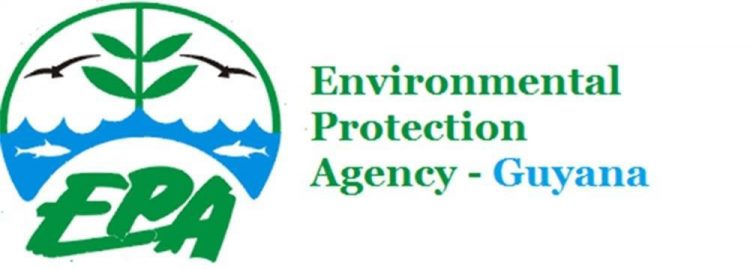The Environmental Protection Agency (EPA) has not been granted a stay of the High Court ruling ordering it to enforce the liability clause in permits it issued to ExxonMobil Guyana for its offshore oil operations.
In fact, Appeal Court Judge, Rishi Persaud, said that the stay will only be addressed if there is a need, since he intends to complete the matter before him, way in advance of the June 10th deadline set by the High Court for the EPA’s compliance.
Justice Persaud made it clear that the preliminary matter to be dispensed with before him, is a narrow one, simply concerning whether the EPA appeal has prospects of succeeding.
 Attorney Sanjeev Datadin who represents the EPA, had sought to frontally raise the issue of the stay.
Attorney Sanjeev Datadin who represents the EPA, had sought to frontally raise the issue of the stay.
He begged Justice Persaud to accede his request and grant the stay, pending the hearing and determination of the preliminary matter.
Senior Counsel Seenath Jairam who represents the litigants, by whom the action against the EPA had been brought was, however, prompt in his objection to any stay being granted; arguing that the Agency first of all has no standing to even make such a request.
Before having to be cautioned and reminded by Justice Persaud that the stay was not going to be dealt with for now, Jairam submitted that the EPA (Appellants) was in contempt of the orders made by the High Court.
His contention was that the Agency ought to bring itself into compliance with the ruling of the High Court.
Datadin interjected in a bid to enquire what contempt the EPA was liable for.
Darshan Ramdhani KC who represents the EPA as well, also pleaded with the Court to grant a stay.
He submitted that even if the preliminary issue and the substantive appeal were to be dispensed with before June 10th, as Justice Persaud indicated could be likely; there would be a number of other procedural things to be followed that are likely to go beyond that deadline set for compliance and which can result in a cost to the State.
Again, however, Justice Persaud was firm that the stay would not be addressed at this time, but assured that it will, if the need arises.
It was made known by Datadin at the hearing yesterday, that the Attorney General has filed a motion to join the substantive appeal when it comes up before the full bench of the Court of Appeal.
Regarding the matter before him, Justice Persaud has ordered the parties to file and serve submissions no later than May 25th. Meanwhile, oral arguments have been set for May 29th at 10 am.
President of the Transparency Institute of Guyana Inc (TIGI) Frederick Collins, has said that the EPA’s appeal has no merit.
Collins, together with another concerned citizen—Godfrey Whyte—had moved to the court last year to get the EPA to enforce the liability clause in the permits it had issued to ExxonMobil.
In a responding affidavit to the appeal, Collins argues that should there be an oil spill, the environment would be in peril, as would the citizens of Guyana and its neighbouring territories; which will all “suffer irreparable damage.”
Against this background, he contends that the risk of injustice in granting the EPA the stay it is seeking to the High Court judgment, will be way greater, than in refusing it.
The litigants have said that the resort to the court was their bid to ensure that the company takes full financial responsibility for possible resulting harm, loss and/or damage to the environment.
ExxonMobil’s local affiliate, Esso Exploration and Production Guyana Limited (EEPGL) (Esso), has agreed in the permit to provide insurance and an unlimited parent company indemnity to cover all environmental loss and damage that might result from a well blowout, oil spill or other failures in the Liza 1 Development Project in Guyana’s Stabroek Block.
High court Judge Sandil Kissoon in delivering his judgment two weeks ago, said that in the course of the proceedings, the Court found on the evidence that EEPGL was engaged in a “disingenuous attempt which was calculated to deceive, when it sought to dilute its liabilities,” while simultaneously optimising production.
Referencing the ruling, Collins opined that the appeal could have no good prospects of succeeding since the judgment was based on what he said was the “clear and simple wording” of the Esso Permit—that Esso is responsible for “all” costs, and that Esso must provide financial assurance to cover those costs through insurance and parent company guarantees/indemnities.
Collins sought to emphasize the Judge’s finding that the amount of financial assurance required is “all” the costs for clean-up and everything associated therewith as is required in the Permit.
“Nothing could be plainer,” Collins said; while going on to add that he had read the Esso Permit and has not seen any financial limit on the amount of the costs which Esso agreed to bear.
Background
In his ruling, Justice Kissoon said of the EPA, “It has abdicated the exclusive statutory responsibilities entrusted to it by Parliament under the Environmental Protection Act 1996 and the Environmental Protection Regulations 2000 to ensure due compliance by Esso Exploration and Production Guyana Limited.”
Collins and Whyte had argued through their attorneys that “…the agency, through its human minds, including its officers has failed or omitted to carry out or to show that it has carried out its legal duties and or obligations thereby amounting to misfeasance in public office by them and by failing or omitting to act, has acted unreasonably, irregularly or improperly and or has abused its power.”
Justice Kissoon had said that in the course of the proceedings, the court found on the evidence that EEPGL was engaged in a “disingenuous attempt which was calculated to deceive when it sought to dilute its liabilities and settled obligations stipulated and expressed in clear unambiguous terms at Condition 14 of the Environmental Permit (Renewed) while simultaneously optimising production at the Liza Phase 1 Petroleum Production Project in the Stabroek Block Offshore Guyana.”
Directly calling out the EPA, the judge said EEPGL “engaged in a course of action made permissible only by the omissions of a derelict, pliant and submissive Environmental Protection Agency.”
He said that the proceedings brought to the fore the adage, “but for the vigilance of citizens society shall perish.”
The court said it found that Esso was never in doubt as to what its liabilities were as captured under Condition 14 of the Permit, as the stipulations were neither unusual, unique or unauthorised.
Justice Kissoon went on to grant Collins and Whyte the orders they sought in the form of declarations. He also awarded them costs in the sum of $1,500,000.
The judge declared the EPA to be in breach of its statutory duty by its failure and/or omissions to enforce compliance by EEPGL of its financial assurance obligations, and keep indemnified the agency and the Government of Guyana against all environmental obligations of the permit holder and co-venturers within the Stabroek Block.
He also specifically declared that EEPGL had failed to comply with its financial assurance obligation; and further that Condition 14 imposes on EEPGL, “unlimited and uncapped liability for all costs associated with clean up, restoration and compensation for all damages caused by any discharge of any contaminant arising from its exploration, development and petroleum production activities within the Stabroek Block.”
The judge ordered the EPA to issue an Enforcement Notice pursuant to Section 26 (1) and (2) of the Environmental Protection Act, no later than May 9th, directing EEPGL to perform its obligations under the permit and to provide, within 30 days thereafter, the unlimited liability Parent Company Guarantee Agreement and/or unlimited liability Affiliate Company Guarantee to indemnify and keep indemnified the Government of Guyana and the agency against all such environmental obligations of Esso and its co-venturers within the Stabroek block, together with environmental liability insurance as is customary in the international petroleum industry in accordance with the Conditions 14 from an insurance company standing and repute that equates to Grade A Plus as envisaged by Condition 14.
Failure to comply with the order, the judge said, will result in the permit being suspended.
The orders made by Justice Kissoon are to be carried out no later than June 10th.
In addition to Senior Counsel Jairam, Collins and Whyte are being represented by attorneys Melinda Janki and Abiola Wong-Inniss.
EEPGL is being represented by Senior Counsel Edward Luckhoo and Andrew Pollard along with Eleanor Luckhoo.





